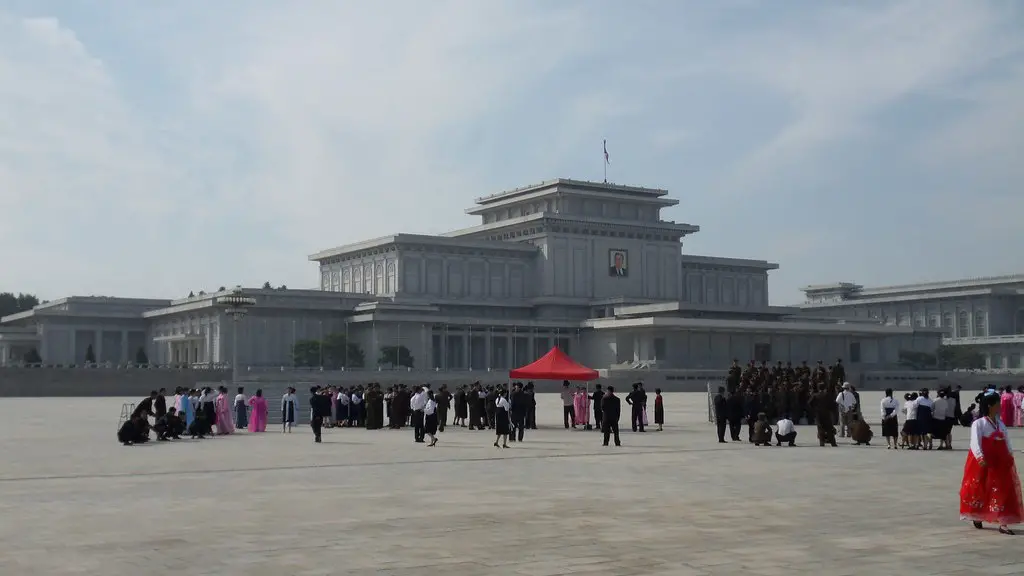North Korea and South Korea haven’t been on the best of terms ever since the Korean War in 1950. Their decades-long conflict has seen countries aligning themselves with either one side or the other. Consequently, it has been the cause of immense suffering for the people of both countries. So why does North Korea hate South Korea?
The North’s antipathy towards the South is rooted in their radically different political systems. North Korea is one of the world’s only remaining communist countries, while South Korea is a democratic Republic. The differences in their governments have driven a wedge between the two countries, with the North taking an extreme stance against the West and its practices. North Korea sees South Korea as an agent of the West and a Major Threat to their national security. North Korea also views South Korea’s active involvement in international organizations and its flourishing cultural presence as an affront to their own isolationist, self-dependent ideology.
Over the years, the North has also accused South Korea of various hostile actions. These include espionage, aggression, and even attempting to destabilize the North Korean Government. This has led to numerous, high-profile incidents, from the sinking of a South Korean warship in 2010 to the contemporary trade embargo. North Korea also has deep suspicions about South Korea’s nuclear weapons programme, viewing it as a major threat to their own security.
In contrast, the South sees North Korea as an illegitimate, oppressive regime. Their view has been strengthened by the North’s numerous human rights violations and its refusal to abandon its nuclear weapons programme. South Korea has also taken a strong stance against the North’s aggressive actions and its threats against the South in recent years.
The conflict between North and South Korea has been exacerbated by the underlying tensions between the superpowers opposing each side. China and Russia have maintained their support of the North Korean regime while the United States, Japan and Europe have provided unwavering support of the South. Each superpower’s backing of their respective sides has made it more difficult to find a resolution to the conflict, creating a situation in which the North and South are locked in a perpetual cycle of distrust and hostility.
The conflict between the two sides has had far-reaching implications, from the suffering of millions of people to the regional tension between the United States and China. Ultimately, the conflict between North and South Korea is about far more than just a border dispute – it is about radically different ideologies and worldviews clashing, with the fate of millions of people in the balance.
The Role of the United Nations
The United Nations has attempted to mediate between the two sides in various attempts at détente, but significant progress has proven elusive. The UN has attempted to broker negotiations between the two sides and came close to a breakthrough with the Agreed Framework established in 1994. However, this breakdown in the talks led to an escalation of hostility between the two sides. Since then, the UN has called for dialogue between the two sides and urged them to work towards a peaceful resolution. In recent years, the UN has also imposed punishing sanctions on the North in an attempt to bring them to the negotiating table.
In addition, the UN has undertaken humanitarian efforts to aid those suffering in both North and South Korea. This includes providing food and medical aid to the North, as well as providing aid to refugees streaming into the South. The UN has also sought to educate the North Korean people about their rights and encourage its government to embrace international standards.
While the UN has been met with mixed success in its attempts to mediate between the North and South, its efforts have been seen as an important step in attempting to reduce the animosity between the two sides.
Cross-Border Tensions
The tension between the two sides has been running high in recent years, with both sides expending significant resources to ensure they remain on a war footing. North Korea has continued to engage in aggressive behaviour along the shared border, prompting retaliations from the South. Meanwhile, the North has continuously used its weapons tests and missile launches to demonstrate its military strength.
Tensions have been further exacerbated by the impasse over the shared demilitarized zone. Despite numerous attempts to reduce the number of soldiers and equipment in the area, both sides have continued to amass troops and weapons at the border. This has only added to the hostility between the North and South, with each side accusing the other of escalating tensions.
The stalemate on the border has also meant that the North and South have been unable to have a meaningful dialogue. North Korea’s recent engagement with the South has been mainly through backchannel diplomatic means, rather than through official means. This has meant that opportunities for dialogue, as well as for preventing further conflict, are often missed.
Ultimately, the tensions between the North and South have prevented any meaningful dialogue, and the distrust and hostility continues unabated. The two sides remain locked in a cycle of animosity and misunderstanding, with no clear resolution in sight.
Continued Confrontation
As the standoff between the two Koreas continues, both sides face the reality that they may never be able to resolve their differences. Despite numerous attempts to ease the tensions, the animosity between the two sides has remained and shows no sign of abating. Consequently, they remain bitterly divided and both sides continue to focus their resources on being prepared for confrontation.
Given the current state of affairs, it is unlikely that North and South Korea will be able to reconcile in the near future. In the absence of dialogue, the two sides will continue to view each other as adversaries, and the stalemate between them will continue. As long as the fundamental differences between the two sides remain, it is unlikely that the conflict will be resolved any time soon.
International Responses
The ongoing tensions between North and South Korea have attracted the attention of the international community. The United States and its allies have taken a strong stance against the North’s provocative behaviour, with the US President warning of severe consequences for any aggression against the South. China, meanwhile, has called for restraint on both sides and urged them to sit down and attempt to find a peaceful resolution.
European countries, Japan and South-east Asian nations have also weighed in on the issue. While they have largely supported the South, they have also called on the North to tone down its rhetoric, refrain from provocations and agree to a peaceful resolution. This stance reflects their desire for a peaceful resolution, without needing to use military intervention.
The international community has also been increasingly vocal on the North’s human rights abuses. The UN has employed numerous economic and diplomatic measures in an attempt to pressure the North to end its oppressive policies, as well as to bring the perpetrators of human rights atrocities to justice.
The international community’s response has been welcomed by the South, who view it as a crucial step towards de-escalating the tensions between the two sides. However, the North has responded with disdain to the international pressure, accusing its detractors of interfering in their internal affairs.
North Korean Propaganda
North Korea’s antipathy towards the South has been perpetuated by its state-run propaganda machine. North Korea’s state media outlets have long portrayed the South in a negative light. It has accused South Korea of a variety of offences, from espionage and aggression to high levels of corruption. The North’s media outlets have also claimed to be the victims of a Western-backed conspiracy, accusing the South of being a puppet of the United States.
This propaganda has had a profound effect on North Korean citizens, who have been indoctrinated from an early age to hate the South. This has made it more difficult for the North and South to find common ground, as the North Korean people are largely cheerleaders for the regime’s hardline stance against the South.
Despite attempts to ease the tensions with the South, North Korea’s propaganda machine continues to churn out anti-South rhetoric. Without a significant change in its stance towards the South, it is unlikely that these tensions will diminish any time soon.
Implications and Impact
The conflict between North and South Korea has had widespread implications. It has caused immense suffering for the people of both countries, as well as deepening the regional tensions between the United States and China. The North’s aggressive behaviour has also meant that it has become increasingly isolated from the international community.
The conflict also has implications for nuclear non-proliferation efforts. The North’s refusal to abandon its nuclear weapons programme has posed a challenge to global non-proliferation regimes. This has been compounded by the United States’ stated willingness to hold talks with the North, which could imply that the international community is willing to accept North Korea as a nuclear power.
Ultimately, the continued animosity between North and South Korea is unlikely to reach a resolution in the near future. The situation has also had wider implications, as it has reinforced the status quo of mistrust and hostility in the region. As long as the stark differences between the two sides remain, it is likely that the conflict will remain unresolved.





